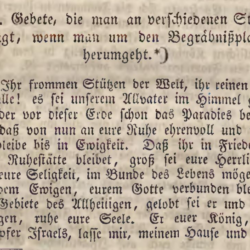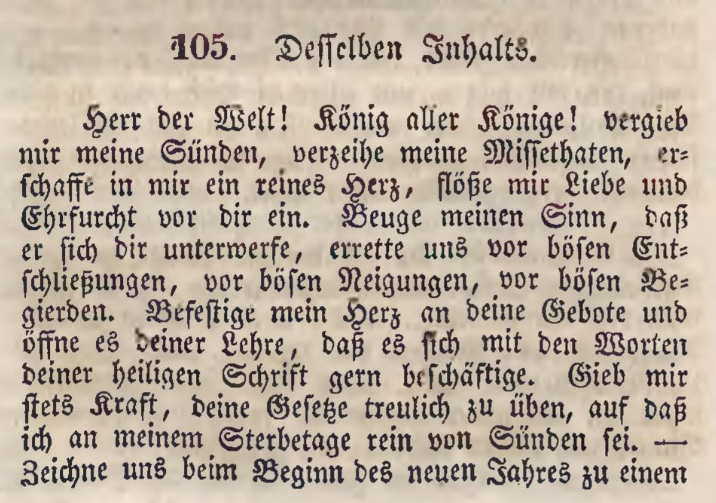| Source (German) | Translation (English) |
|---|---|
Wenn man auf den Begräbnißplatz kommt, betet man zuvörderst Folgendes. |
When one comes to the burial place, one first prays the following. |
Aus hoher Ehrfurcht vor dem Allheiligen, gelobt sei er, aus Ehrfurcht vor seiner heiligen Lehre und vor den Seelen der Heiligen, deren Hülle im Staube ruht, bin ich hierher gekommen zu beten vor dem ewiglebenden Gott, in dessen Hand die Seele alles Lebenden, der Geist alles Fleisches ist, ihm zuvörderst zu danken für alle Gnade und Güte, die er mir erzeugt seitdem ich lebe bis auf diesen Tag. — |
Out of great reverence for the All-Holy One, praise be to Him, out of reverence for His holy teachings and for the souls of the tsadiqim whose shrouds rest in the dust, I have come here to pray before the ever-living God, in Whose hand is the soul of all living things, the spirit of all flesh, to thank Him first of all for all the grace and goodness He has produced for me since I have lived until this day. — |
Ich danke dir, daß mein Wesen so wunderbar ausgezeichnet ist, wunderbar sind deine Werke, das fühlt meine Seele wohl. Unverholen ist dir mein innerstes Wesen, da ich im Verborgenen bereitet, gewebt im tiefsten Schoos der Erde war. Als ich noch nicht gebildet war, sahen mich deine Augen schon. Aufgezeichnet waren vor dir die Lebenstage, die mir zu Theil werden sollten, als noch keiner derselben vorhanden war. Wie köstlich sind mir, o Gott, deine Gedanken, wie unendlich ist ihre Anzahl! Unzählbar sind sie mir, mehr als der Sand am Meere, wenn ich zu endigen glaube, bin ich noch bei dir. — |
I thank you that my being is so wonderfully excellent, wonderful are your works, my soul feels this well. My innermost being is exposed to you, since I was prepared in secret [by you], woven in the deepest bosom of the earth. When I was not yet formed, your eyes already saw me. The days of [my] life, which were to be granted to me, were recorded before you, when none of them had yet come into being. How exquisite are your thoughts to me, O God, how infinite is their number! They are innumerable to me, more than the sand on the sea; when I think I have come to an end, I am still with you. |
Vor ihm also will ich mein Herz ausschütten, meine Leiden aussprechen, an diesem heiligen Orte, an den Gräbern dieser Frommen und Heiligen, deren Leib hier an die Erde gebunden, der Geist aber zum Himmel strebt, wo der Ewige ihn in Obhut hält, und ihn im Abglanz des himmlischen Glanzes beseliget. Es freuen sich die Frommen in ihrer Herrlichkeit, jauchzen auf ihrem Lager. — Jetzt in der Krone ihrer Tugend, erkennen sie die Majestät des himmlischen Königs, und sind selig in dem Gute, das den Frommen jenseits aufbewahrt ist. Außer Gott schaut kein Auge was denen zu Theil wird, die auf ihn vertraut haben. Wohl dem Volke, dem es so ergeht, wohl dem Volke, dessen Gott der Ewige ist. Heil denen, die nur auf ihn hoffen, heil dem Manne, der auf den Ewigen seine Zuversicht setzt. Wohl dem, der da hofft und die Tage erreicht, wo der Ewiglebende euch belebt; wie er dem schätzbaren Propheten Daniel verheißen hat: „Du wirst ruhen, und zu dem dir bestimmten Lohn erwachen, am Ende der Tage.” (Daniel 12, 31) Ferner heißt es: Siehe, ich öffne eure Gräber, ziehe euch aus denselben und bringe euch auf Israelitisches Erdreich.” (Ezechiel 37, 12) Ferner heißt es: „Sie werden hervor blühen in der Stadt wie das Kraut des Feldes.” (Psalms 72, 16) Ferner spricht der Prophet: „Wüste und Oede werden sich freuen wüstes Gefilde wird wie die Lilie aufblühen. Es wird blühen und fröhlich stehen in Lust und Freude. Die Herrlichkeit des Libanon ist ihm gegeben, der Glanz des Karmel und des Ischaron; sie werden schauen die Herrlichkeit des Ewigen, den Glanz unseres Gottes.” (Jesaja 35, 1-2) Ja, sie werden aufleben, deine Todten, meine Leichen werden auferstehn. Erwacht und jauchzet, die ihr im Staube ruht. (Jesaja 26, 19) Gott tödtet und belebt, er senkt hinab in die Gruft und bringt wieder herauf! (1. Samuel 2, 6) Er von dem es heißt: Ich tödte und belebe, schlage Wunden und heile wieder. (Hosea 6, 1) Gepriesen seist du, o Gott, der du treu bist in der Verheißung die Todten zu erwecken. |
So before him I will pour out my heart, express my sufferings, in this holy place, at the graves of these pious and holy ones, whose bodies are bound here to the earth, even as their spirit strives toward heaven, where the Eternal holds it in care, and blesses it in the radiance of the heavenly splendor. The pious rejoice in their glory, exult on their bed. — Now in the crown of their virtue, they recognize the majesty of the heavenly King, and are blessed in the good that is kept for the pious beyond. Apart from God, no eye sees what is granted to those who have trusted in him. Blessed are the people who are so fortunate, blessed are the people whose God is the Eternal. Hail to those who hope only in him, hail to the man who puts his trust in the Eternal. Blessed is he who hopes and reaches the days when the Eternal One will revive you; as He promised the estimable prophet Daniel: “You will rest, and awake to your appointed reward, at the end of days.” (Daniel 12:31) Further, it is said, “Behold, I will open your graves, pull you out of them, and bring you to Israelite soil.” (Ezekiel 37:12) Further, it says, “You will blossom forth in the city like the herb of the field.” (Psalms 72:16) Furthermore, the prophet says: “Desert and desert will rejoice, desolate land will blossom like the lily. It will blossom and stand joyful in delight and gladness. The glory of Lebanon is given to it, the splendor of Carmel and Isharon; they will behold the glory of the Eternal, the splendor of our God.” (Isaiah 35:1-2) Yes, they shall rise, your dead, my dead bodies shall rise. Awake and rejoice, you who rest in the dust. (Isaiah 26:19) God kills and revives, he lowers into the tomb and brings up again! (1 Samuel 2:6) He of whom it is said: I kill and revive, I strike wounds and heal again. (Hosea 6:1) Blessed are you, O God, who are faithful in the promise to raise the dead. |
“Wenn man auf den Begräbnißplatz kommt, betet man zuvörderst Folgendes” was translated/adapted by Yehoshua Heshil Miro and published in his anthology of teḥinot, בית יעקב (Beit Yaaqov) Allgemeines Gebetbuch für gebildete Frauen mosaischer Religion. It first appears in the 1835 edition as teḥinah №102 on pp. 200-202.
We welcome corrections and improvements. The transcription of the German from Latin script in Fraktur type provided machine-readable text for a machine translation by DeepL, which we then edited for accuracy and clarity. –Aharon Varady
Source(s)


“Wenn man auf den Begräbnißplatz kommt | When one comes to the burial place, a teḥinah by Yehoshua Heshil Miro (1835)” is shared through the Open Siddur Project with a Creative Commons Attribution-ShareAlike 4.0 International copyleft license.










Leave a Reply